Corporate Social Responsibility: Role, Limits, and Impact on Business
VerifiedAdded on 2020/02/05
|12
|3097
|252
Essay
AI Summary
This essay delves into the multifaceted concept of Corporate Social Responsibility (CSR), examining its voluntary commitment to integrate social, environmental, and economic considerations into business practices. The paper highlights how CSR has evolved beyond mere compliance to encompass stakeholder analysis, workplace dynamics, marketplace strategies, and environmental dimensions. It explores CSR's impact on corporate identity, branding, and ethical behavior while acknowledging its increasing importance due to globalization and changing societal values. The essay also discusses the role of CSR in fostering partnerships, promoting sustainability, and influencing public perception through media coverage and employee engagement. Furthermore, it addresses the limitations of CSR, considering the balance between environmental and stakeholder benefits, the influence of codes of conduct, and the existing legal and ethical obligations of businesses. The discussion encompasses the significance of a company's social role, relationships within the market, and the promotion of creativity and innovation.
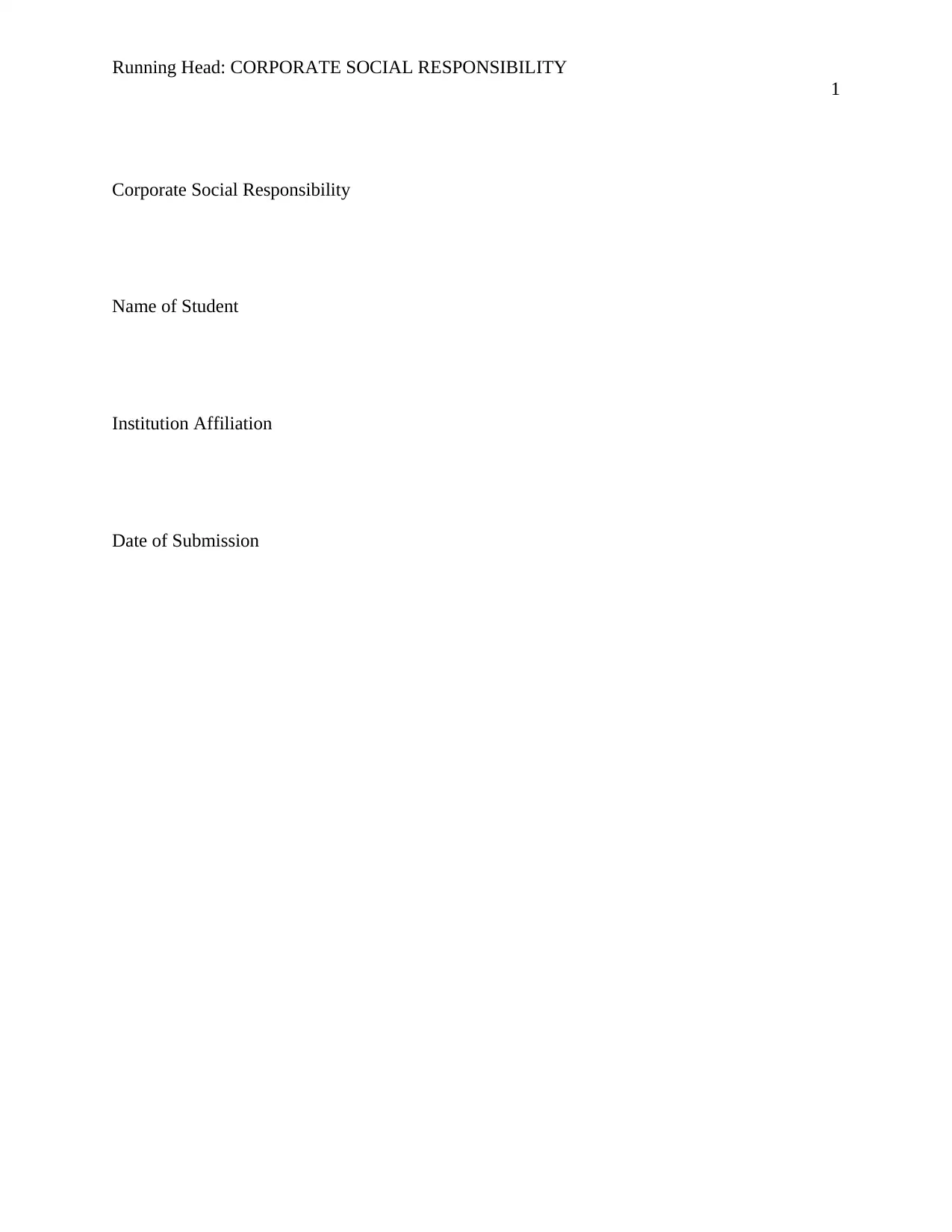
Running Head: CORPORATE SOCIAL RESPONSIBILITY
1
Corporate Social Responsibility
Name of Student
Institution Affiliation
Date of Submission
1
Corporate Social Responsibility
Name of Student
Institution Affiliation
Date of Submission
Paraphrase This Document
Need a fresh take? Get an instant paraphrase of this document with our AI Paraphraser
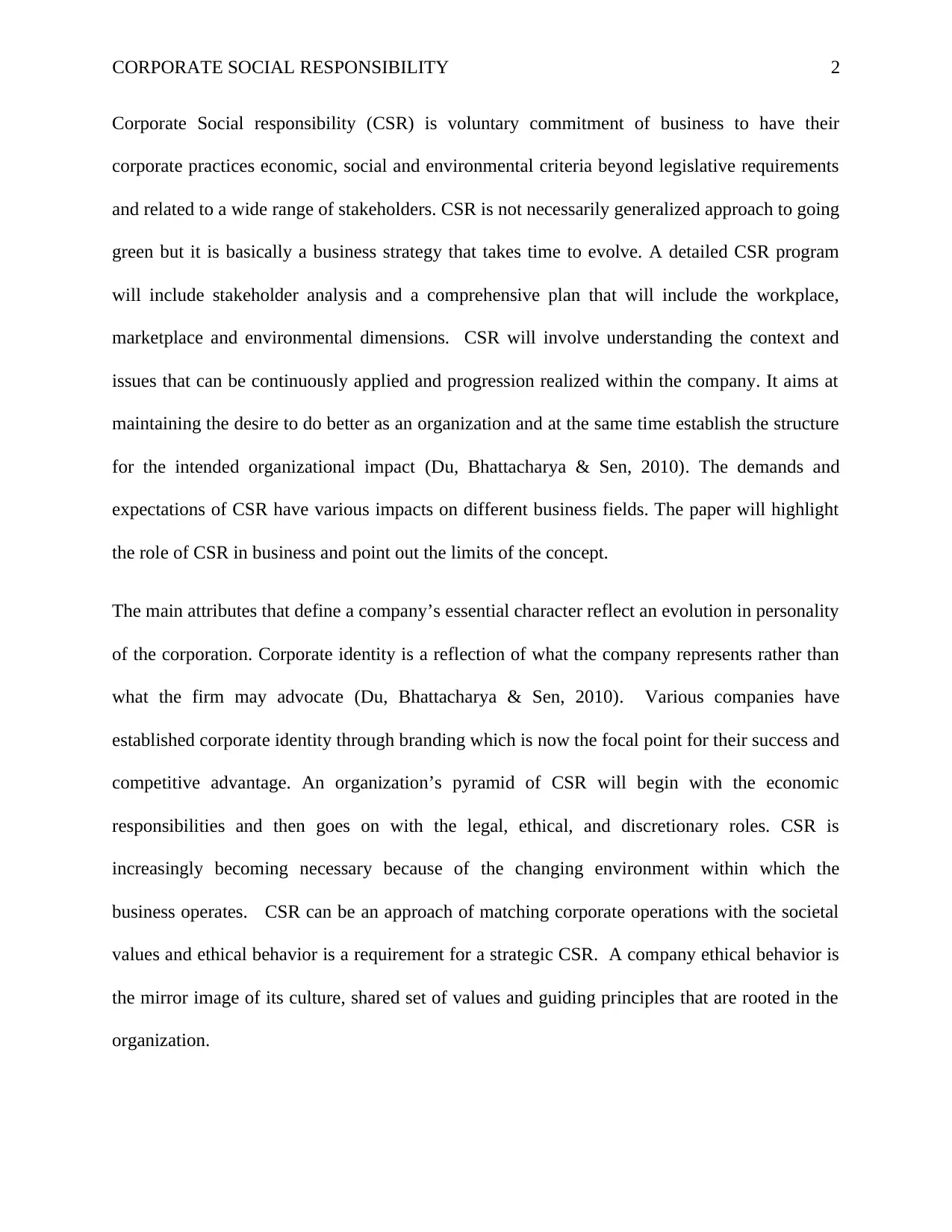
CORPORATE SOCIAL RESPONSIBILITY 2
Corporate Social responsibility (CSR) is voluntary commitment of business to have their
corporate practices economic, social and environmental criteria beyond legislative requirements
and related to a wide range of stakeholders. CSR is not necessarily generalized approach to going
green but it is basically a business strategy that takes time to evolve. A detailed CSR program
will include stakeholder analysis and a comprehensive plan that will include the workplace,
marketplace and environmental dimensions. CSR will involve understanding the context and
issues that can be continuously applied and progression realized within the company. It aims at
maintaining the desire to do better as an organization and at the same time establish the structure
for the intended organizational impact (Du, Bhattacharya & Sen, 2010). The demands and
expectations of CSR have various impacts on different business fields. The paper will highlight
the role of CSR in business and point out the limits of the concept.
The main attributes that define a company’s essential character reflect an evolution in personality
of the corporation. Corporate identity is a reflection of what the company represents rather than
what the firm may advocate (Du, Bhattacharya & Sen, 2010). Various companies have
established corporate identity through branding which is now the focal point for their success and
competitive advantage. An organization’s pyramid of CSR will begin with the economic
responsibilities and then goes on with the legal, ethical, and discretionary roles. CSR is
increasingly becoming necessary because of the changing environment within which the
business operates. CSR can be an approach of matching corporate operations with the societal
values and ethical behavior is a requirement for a strategic CSR. A company ethical behavior is
the mirror image of its culture, shared set of values and guiding principles that are rooted in the
organization.
Corporate Social responsibility (CSR) is voluntary commitment of business to have their
corporate practices economic, social and environmental criteria beyond legislative requirements
and related to a wide range of stakeholders. CSR is not necessarily generalized approach to going
green but it is basically a business strategy that takes time to evolve. A detailed CSR program
will include stakeholder analysis and a comprehensive plan that will include the workplace,
marketplace and environmental dimensions. CSR will involve understanding the context and
issues that can be continuously applied and progression realized within the company. It aims at
maintaining the desire to do better as an organization and at the same time establish the structure
for the intended organizational impact (Du, Bhattacharya & Sen, 2010). The demands and
expectations of CSR have various impacts on different business fields. The paper will highlight
the role of CSR in business and point out the limits of the concept.
The main attributes that define a company’s essential character reflect an evolution in personality
of the corporation. Corporate identity is a reflection of what the company represents rather than
what the firm may advocate (Du, Bhattacharya & Sen, 2010). Various companies have
established corporate identity through branding which is now the focal point for their success and
competitive advantage. An organization’s pyramid of CSR will begin with the economic
responsibilities and then goes on with the legal, ethical, and discretionary roles. CSR is
increasingly becoming necessary because of the changing environment within which the
business operates. CSR can be an approach of matching corporate operations with the societal
values and ethical behavior is a requirement for a strategic CSR. A company ethical behavior is
the mirror image of its culture, shared set of values and guiding principles that are rooted in the
organization.
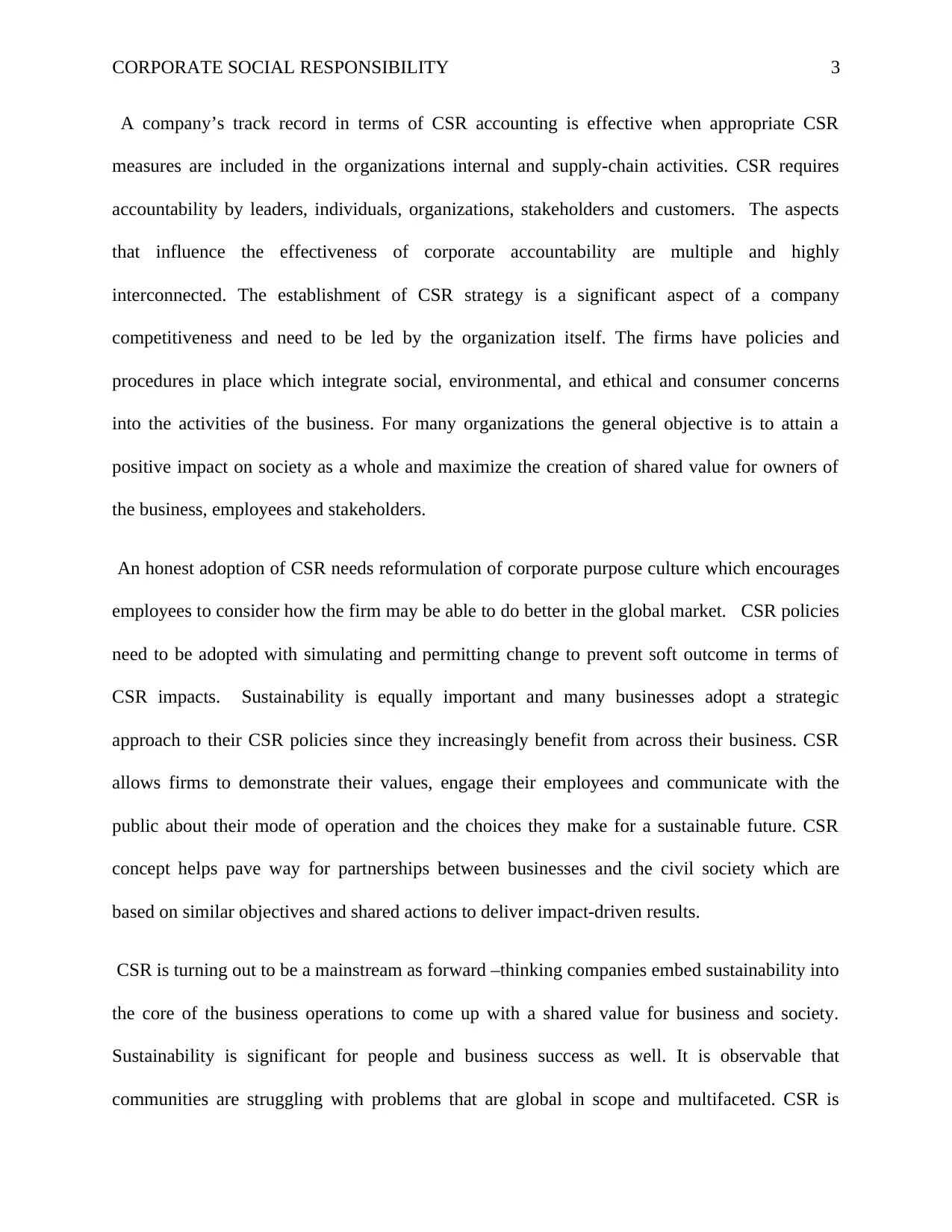
CORPORATE SOCIAL RESPONSIBILITY 3
A company’s track record in terms of CSR accounting is effective when appropriate CSR
measures are included in the organizations internal and supply-chain activities. CSR requires
accountability by leaders, individuals, organizations, stakeholders and customers. The aspects
that influence the effectiveness of corporate accountability are multiple and highly
interconnected. The establishment of CSR strategy is a significant aspect of a company
competitiveness and need to be led by the organization itself. The firms have policies and
procedures in place which integrate social, environmental, and ethical and consumer concerns
into the activities of the business. For many organizations the general objective is to attain a
positive impact on society as a whole and maximize the creation of shared value for owners of
the business, employees and stakeholders.
An honest adoption of CSR needs reformulation of corporate purpose culture which encourages
employees to consider how the firm may be able to do better in the global market. CSR policies
need to be adopted with simulating and permitting change to prevent soft outcome in terms of
CSR impacts. Sustainability is equally important and many businesses adopt a strategic
approach to their CSR policies since they increasingly benefit from across their business. CSR
allows firms to demonstrate their values, engage their employees and communicate with the
public about their mode of operation and the choices they make for a sustainable future. CSR
concept helps pave way for partnerships between businesses and the civil society which are
based on similar objectives and shared actions to deliver impact-driven results.
CSR is turning out to be a mainstream as forward –thinking companies embed sustainability into
the core of the business operations to come up with a shared value for business and society.
Sustainability is significant for people and business success as well. It is observable that
communities are struggling with problems that are global in scope and multifaceted. CSR is
A company’s track record in terms of CSR accounting is effective when appropriate CSR
measures are included in the organizations internal and supply-chain activities. CSR requires
accountability by leaders, individuals, organizations, stakeholders and customers. The aspects
that influence the effectiveness of corporate accountability are multiple and highly
interconnected. The establishment of CSR strategy is a significant aspect of a company
competitiveness and need to be led by the organization itself. The firms have policies and
procedures in place which integrate social, environmental, and ethical and consumer concerns
into the activities of the business. For many organizations the general objective is to attain a
positive impact on society as a whole and maximize the creation of shared value for owners of
the business, employees and stakeholders.
An honest adoption of CSR needs reformulation of corporate purpose culture which encourages
employees to consider how the firm may be able to do better in the global market. CSR policies
need to be adopted with simulating and permitting change to prevent soft outcome in terms of
CSR impacts. Sustainability is equally important and many businesses adopt a strategic
approach to their CSR policies since they increasingly benefit from across their business. CSR
allows firms to demonstrate their values, engage their employees and communicate with the
public about their mode of operation and the choices they make for a sustainable future. CSR
concept helps pave way for partnerships between businesses and the civil society which are
based on similar objectives and shared actions to deliver impact-driven results.
CSR is turning out to be a mainstream as forward –thinking companies embed sustainability into
the core of the business operations to come up with a shared value for business and society.
Sustainability is significant for people and business success as well. It is observable that
communities are struggling with problems that are global in scope and multifaceted. CSR is
⊘ This is a preview!⊘
Do you want full access?
Subscribe today to unlock all pages.

Trusted by 1+ million students worldwide
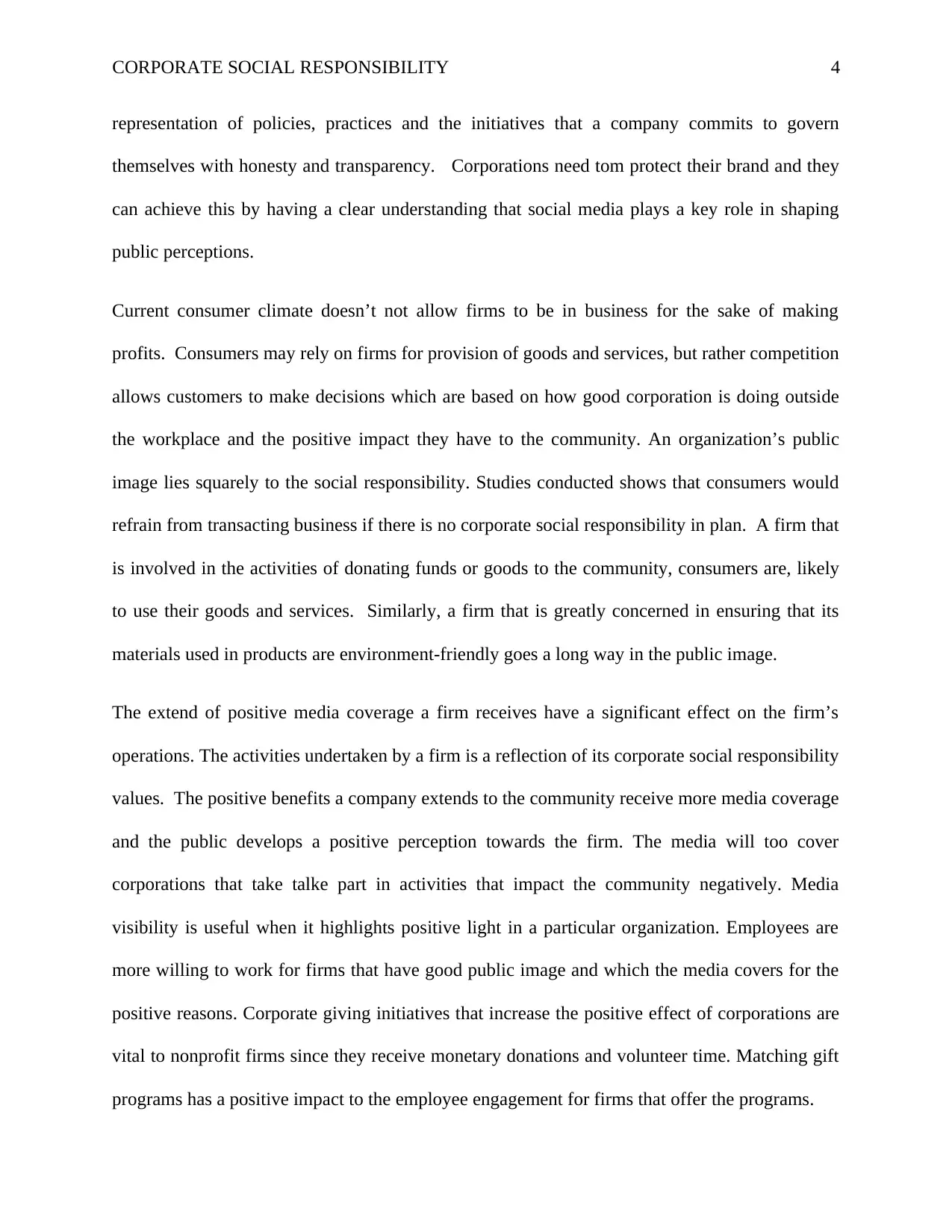
CORPORATE SOCIAL RESPONSIBILITY 4
representation of policies, practices and the initiatives that a company commits to govern
themselves with honesty and transparency. Corporations need tom protect their brand and they
can achieve this by having a clear understanding that social media plays a key role in shaping
public perceptions.
Current consumer climate doesn’t not allow firms to be in business for the sake of making
profits. Consumers may rely on firms for provision of goods and services, but rather competition
allows customers to make decisions which are based on how good corporation is doing outside
the workplace and the positive impact they have to the community. An organization’s public
image lies squarely to the social responsibility. Studies conducted shows that consumers would
refrain from transacting business if there is no corporate social responsibility in plan. A firm that
is involved in the activities of donating funds or goods to the community, consumers are, likely
to use their goods and services. Similarly, a firm that is greatly concerned in ensuring that its
materials used in products are environment-friendly goes a long way in the public image.
The extend of positive media coverage a firm receives have a significant effect on the firm’s
operations. The activities undertaken by a firm is a reflection of its corporate social responsibility
values. The positive benefits a company extends to the community receive more media coverage
and the public develops a positive perception towards the firm. The media will too cover
corporations that take talke part in activities that impact the community negatively. Media
visibility is useful when it highlights positive light in a particular organization. Employees are
more willing to work for firms that have good public image and which the media covers for the
positive reasons. Corporate giving initiatives that increase the positive effect of corporations are
vital to nonprofit firms since they receive monetary donations and volunteer time. Matching gift
programs has a positive impact to the employee engagement for firms that offer the programs.
representation of policies, practices and the initiatives that a company commits to govern
themselves with honesty and transparency. Corporations need tom protect their brand and they
can achieve this by having a clear understanding that social media plays a key role in shaping
public perceptions.
Current consumer climate doesn’t not allow firms to be in business for the sake of making
profits. Consumers may rely on firms for provision of goods and services, but rather competition
allows customers to make decisions which are based on how good corporation is doing outside
the workplace and the positive impact they have to the community. An organization’s public
image lies squarely to the social responsibility. Studies conducted shows that consumers would
refrain from transacting business if there is no corporate social responsibility in plan. A firm that
is involved in the activities of donating funds or goods to the community, consumers are, likely
to use their goods and services. Similarly, a firm that is greatly concerned in ensuring that its
materials used in products are environment-friendly goes a long way in the public image.
The extend of positive media coverage a firm receives have a significant effect on the firm’s
operations. The activities undertaken by a firm is a reflection of its corporate social responsibility
values. The positive benefits a company extends to the community receive more media coverage
and the public develops a positive perception towards the firm. The media will too cover
corporations that take talke part in activities that impact the community negatively. Media
visibility is useful when it highlights positive light in a particular organization. Employees are
more willing to work for firms that have good public image and which the media covers for the
positive reasons. Corporate giving initiatives that increase the positive effect of corporations are
vital to nonprofit firms since they receive monetary donations and volunteer time. Matching gift
programs has a positive impact to the employee engagement for firms that offer the programs.
Paraphrase This Document
Need a fresh take? Get an instant paraphrase of this document with our AI Paraphraser
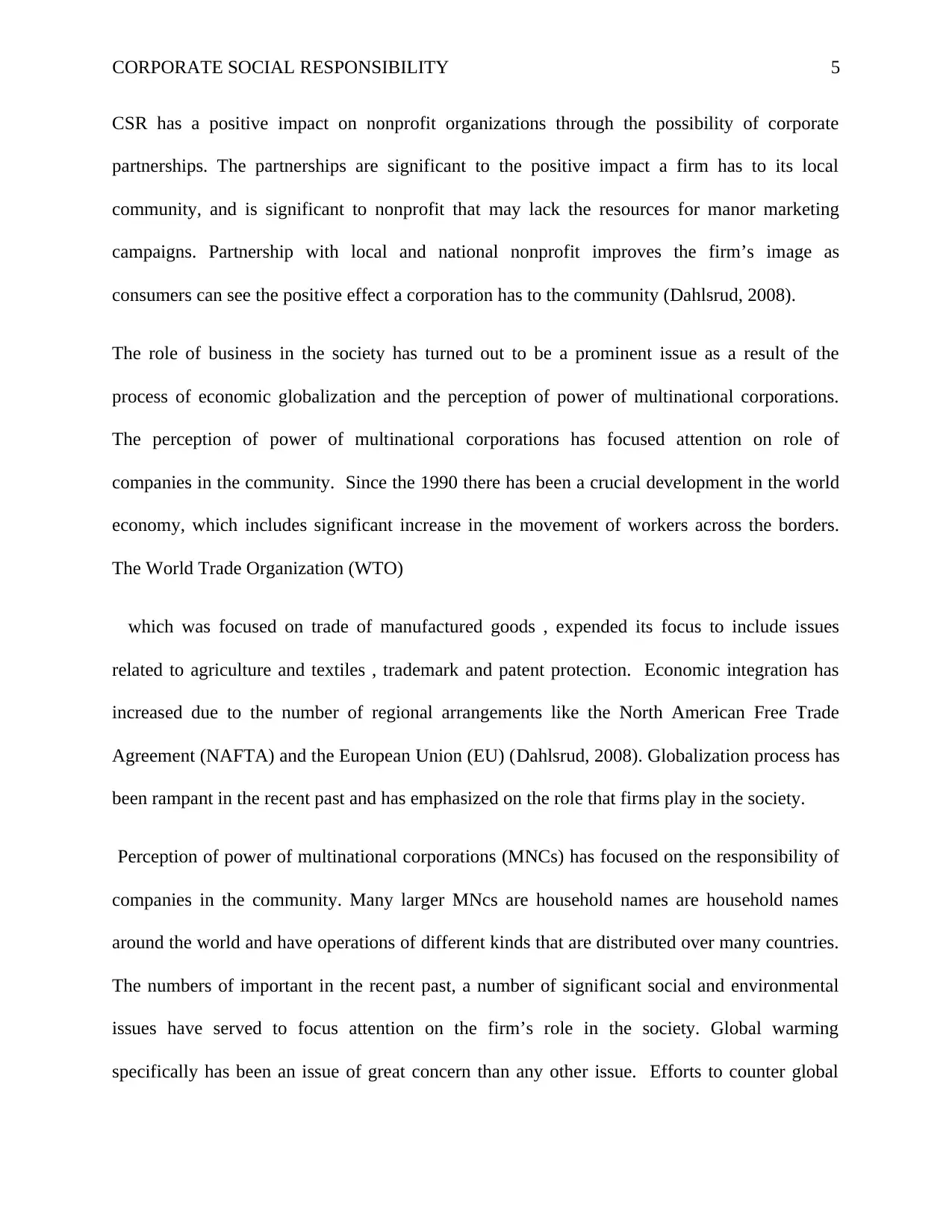
CORPORATE SOCIAL RESPONSIBILITY 5
CSR has a positive impact on nonprofit organizations through the possibility of corporate
partnerships. The partnerships are significant to the positive impact a firm has to its local
community, and is significant to nonprofit that may lack the resources for manor marketing
campaigns. Partnership with local and national nonprofit improves the firm’s image as
consumers can see the positive effect a corporation has to the community (Dahlsrud, 2008).
The role of business in the society has turned out to be a prominent issue as a result of the
process of economic globalization and the perception of power of multinational corporations.
The perception of power of multinational corporations has focused attention on role of
companies in the community. Since the 1990 there has been a crucial development in the world
economy, which includes significant increase in the movement of workers across the borders.
The World Trade Organization (WTO)
which was focused on trade of manufactured goods , expended its focus to include issues
related to agriculture and textiles , trademark and patent protection. Economic integration has
increased due to the number of regional arrangements like the North American Free Trade
Agreement (NAFTA) and the European Union (EU) (Dahlsrud, 2008). Globalization process has
been rampant in the recent past and has emphasized on the role that firms play in the society.
Perception of power of multinational corporations (MNCs) has focused on the responsibility of
companies in the community. Many larger MNcs are household names are household names
around the world and have operations of different kinds that are distributed over many countries.
The numbers of important in the recent past, a number of significant social and environmental
issues have served to focus attention on the firm’s role in the society. Global warming
specifically has been an issue of great concern than any other issue. Efforts to counter global
CSR has a positive impact on nonprofit organizations through the possibility of corporate
partnerships. The partnerships are significant to the positive impact a firm has to its local
community, and is significant to nonprofit that may lack the resources for manor marketing
campaigns. Partnership with local and national nonprofit improves the firm’s image as
consumers can see the positive effect a corporation has to the community (Dahlsrud, 2008).
The role of business in the society has turned out to be a prominent issue as a result of the
process of economic globalization and the perception of power of multinational corporations.
The perception of power of multinational corporations has focused attention on role of
companies in the community. Since the 1990 there has been a crucial development in the world
economy, which includes significant increase in the movement of workers across the borders.
The World Trade Organization (WTO)
which was focused on trade of manufactured goods , expended its focus to include issues
related to agriculture and textiles , trademark and patent protection. Economic integration has
increased due to the number of regional arrangements like the North American Free Trade
Agreement (NAFTA) and the European Union (EU) (Dahlsrud, 2008). Globalization process has
been rampant in the recent past and has emphasized on the role that firms play in the society.
Perception of power of multinational corporations (MNCs) has focused on the responsibility of
companies in the community. Many larger MNcs are household names are household names
around the world and have operations of different kinds that are distributed over many countries.
The numbers of important in the recent past, a number of significant social and environmental
issues have served to focus attention on the firm’s role in the society. Global warming
specifically has been an issue of great concern than any other issue. Efforts to counter global
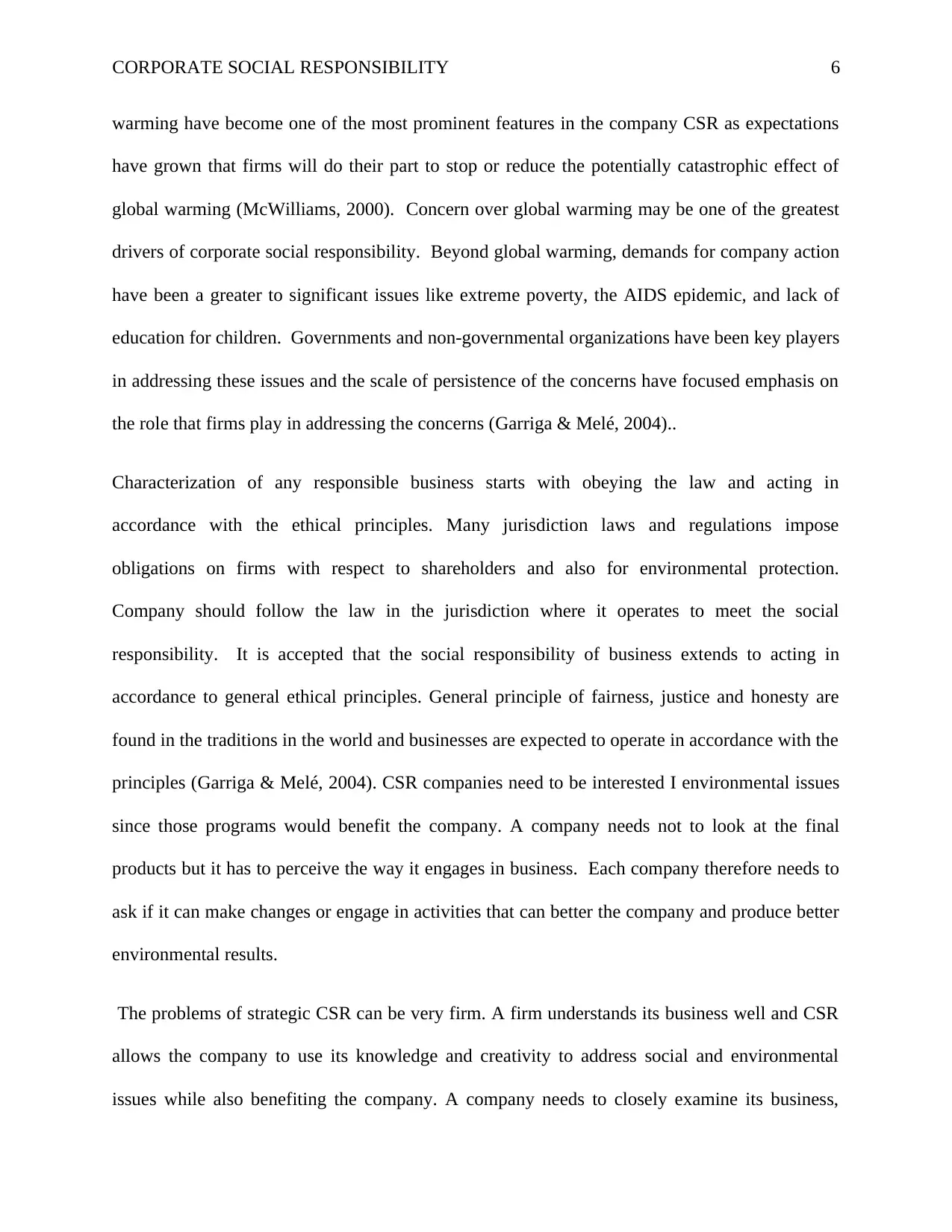
CORPORATE SOCIAL RESPONSIBILITY 6
warming have become one of the most prominent features in the company CSR as expectations
have grown that firms will do their part to stop or reduce the potentially catastrophic effect of
global warming (McWilliams, 2000). Concern over global warming may be one of the greatest
drivers of corporate social responsibility. Beyond global warming, demands for company action
have been a greater to significant issues like extreme poverty, the AIDS epidemic, and lack of
education for children. Governments and non-governmental organizations have been key players
in addressing these issues and the scale of persistence of the concerns have focused emphasis on
the role that firms play in addressing the concerns (Garriga & Melé, 2004)..
Characterization of any responsible business starts with obeying the law and acting in
accordance with the ethical principles. Many jurisdiction laws and regulations impose
obligations on firms with respect to shareholders and also for environmental protection.
Company should follow the law in the jurisdiction where it operates to meet the social
responsibility. It is accepted that the social responsibility of business extends to acting in
accordance to general ethical principles. General principle of fairness, justice and honesty are
found in the traditions in the world and businesses are expected to operate in accordance with the
principles (Garriga & Melé, 2004). CSR companies need to be interested I environmental issues
since those programs would benefit the company. A company needs not to look at the final
products but it has to perceive the way it engages in business. Each company therefore needs to
ask if it can make changes or engage in activities that can better the company and produce better
environmental results.
The problems of strategic CSR can be very firm. A firm understands its business well and CSR
allows the company to use its knowledge and creativity to address social and environmental
issues while also benefiting the company. A company needs to closely examine its business,
warming have become one of the most prominent features in the company CSR as expectations
have grown that firms will do their part to stop or reduce the potentially catastrophic effect of
global warming (McWilliams, 2000). Concern over global warming may be one of the greatest
drivers of corporate social responsibility. Beyond global warming, demands for company action
have been a greater to significant issues like extreme poverty, the AIDS epidemic, and lack of
education for children. Governments and non-governmental organizations have been key players
in addressing these issues and the scale of persistence of the concerns have focused emphasis on
the role that firms play in addressing the concerns (Garriga & Melé, 2004)..
Characterization of any responsible business starts with obeying the law and acting in
accordance with the ethical principles. Many jurisdiction laws and regulations impose
obligations on firms with respect to shareholders and also for environmental protection.
Company should follow the law in the jurisdiction where it operates to meet the social
responsibility. It is accepted that the social responsibility of business extends to acting in
accordance to general ethical principles. General principle of fairness, justice and honesty are
found in the traditions in the world and businesses are expected to operate in accordance with the
principles (Garriga & Melé, 2004). CSR companies need to be interested I environmental issues
since those programs would benefit the company. A company needs not to look at the final
products but it has to perceive the way it engages in business. Each company therefore needs to
ask if it can make changes or engage in activities that can better the company and produce better
environmental results.
The problems of strategic CSR can be very firm. A firm understands its business well and CSR
allows the company to use its knowledge and creativity to address social and environmental
issues while also benefiting the company. A company needs to closely examine its business,
⊘ This is a preview!⊘
Do you want full access?
Subscribe today to unlock all pages.

Trusted by 1+ million students worldwide
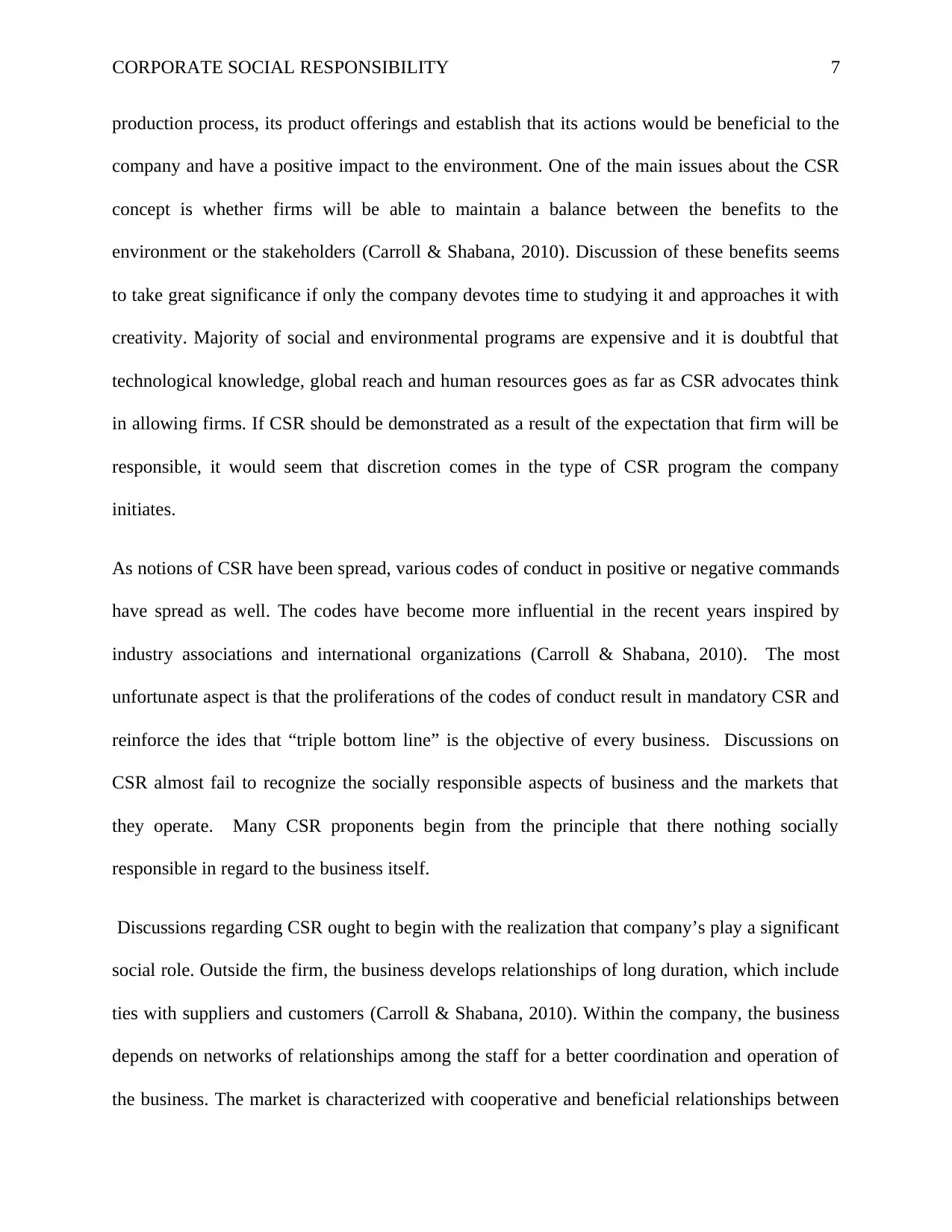
CORPORATE SOCIAL RESPONSIBILITY 7
production process, its product offerings and establish that its actions would be beneficial to the
company and have a positive impact to the environment. One of the main issues about the CSR
concept is whether firms will be able to maintain a balance between the benefits to the
environment or the stakeholders (Carroll & Shabana, 2010). Discussion of these benefits seems
to take great significance if only the company devotes time to studying it and approaches it with
creativity. Majority of social and environmental programs are expensive and it is doubtful that
technological knowledge, global reach and human resources goes as far as CSR advocates think
in allowing firms. If CSR should be demonstrated as a result of the expectation that firm will be
responsible, it would seem that discretion comes in the type of CSR program the company
initiates.
As notions of CSR have been spread, various codes of conduct in positive or negative commands
have spread as well. The codes have become more influential in the recent years inspired by
industry associations and international organizations (Carroll & Shabana, 2010). The most
unfortunate aspect is that the proliferations of the codes of conduct result in mandatory CSR and
reinforce the ides that “triple bottom line” is the objective of every business. Discussions on
CSR almost fail to recognize the socially responsible aspects of business and the markets that
they operate. Many CSR proponents begin from the principle that there nothing socially
responsible in regard to the business itself.
Discussions regarding CSR ought to begin with the realization that company’s play a significant
social role. Outside the firm, the business develops relationships of long duration, which include
ties with suppliers and customers (Carroll & Shabana, 2010). Within the company, the business
depends on networks of relationships among the staff for a better coordination and operation of
the business. The market is characterized with cooperative and beneficial relationships between
production process, its product offerings and establish that its actions would be beneficial to the
company and have a positive impact to the environment. One of the main issues about the CSR
concept is whether firms will be able to maintain a balance between the benefits to the
environment or the stakeholders (Carroll & Shabana, 2010). Discussion of these benefits seems
to take great significance if only the company devotes time to studying it and approaches it with
creativity. Majority of social and environmental programs are expensive and it is doubtful that
technological knowledge, global reach and human resources goes as far as CSR advocates think
in allowing firms. If CSR should be demonstrated as a result of the expectation that firm will be
responsible, it would seem that discretion comes in the type of CSR program the company
initiates.
As notions of CSR have been spread, various codes of conduct in positive or negative commands
have spread as well. The codes have become more influential in the recent years inspired by
industry associations and international organizations (Carroll & Shabana, 2010). The most
unfortunate aspect is that the proliferations of the codes of conduct result in mandatory CSR and
reinforce the ides that “triple bottom line” is the objective of every business. Discussions on
CSR almost fail to recognize the socially responsible aspects of business and the markets that
they operate. Many CSR proponents begin from the principle that there nothing socially
responsible in regard to the business itself.
Discussions regarding CSR ought to begin with the realization that company’s play a significant
social role. Outside the firm, the business develops relationships of long duration, which include
ties with suppliers and customers (Carroll & Shabana, 2010). Within the company, the business
depends on networks of relationships among the staff for a better coordination and operation of
the business. The market is characterized with cooperative and beneficial relationships between
Paraphrase This Document
Need a fresh take? Get an instant paraphrase of this document with our AI Paraphraser
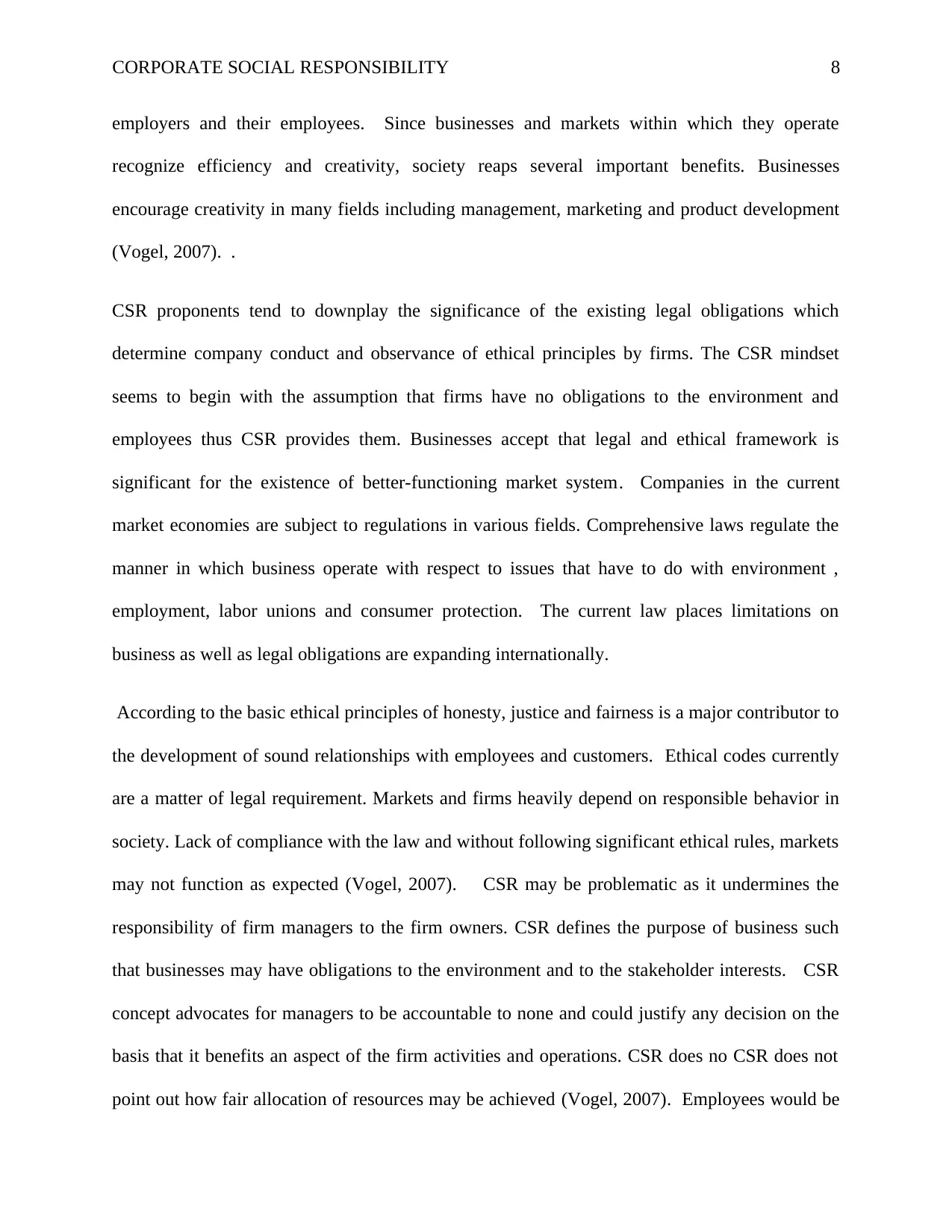
CORPORATE SOCIAL RESPONSIBILITY 8
employers and their employees. Since businesses and markets within which they operate
recognize efficiency and creativity, society reaps several important benefits. Businesses
encourage creativity in many fields including management, marketing and product development
(Vogel, 2007). .
CSR proponents tend to downplay the significance of the existing legal obligations which
determine company conduct and observance of ethical principles by firms. The CSR mindset
seems to begin with the assumption that firms have no obligations to the environment and
employees thus CSR provides them. Businesses accept that legal and ethical framework is
significant for the existence of better-functioning market system. Companies in the current
market economies are subject to regulations in various fields. Comprehensive laws regulate the
manner in which business operate with respect to issues that have to do with environment ,
employment, labor unions and consumer protection. The current law places limitations on
business as well as legal obligations are expanding internationally.
According to the basic ethical principles of honesty, justice and fairness is a major contributor to
the development of sound relationships with employees and customers. Ethical codes currently
are a matter of legal requirement. Markets and firms heavily depend on responsible behavior in
society. Lack of compliance with the law and without following significant ethical rules, markets
may not function as expected (Vogel, 2007). CSR may be problematic as it undermines the
responsibility of firm managers to the firm owners. CSR defines the purpose of business such
that businesses may have obligations to the environment and to the stakeholder interests. CSR
concept advocates for managers to be accountable to none and could justify any decision on the
basis that it benefits an aspect of the firm activities and operations. CSR does no CSR does not
point out how fair allocation of resources may be achieved (Vogel, 2007). Employees would be
employers and their employees. Since businesses and markets within which they operate
recognize efficiency and creativity, society reaps several important benefits. Businesses
encourage creativity in many fields including management, marketing and product development
(Vogel, 2007). .
CSR proponents tend to downplay the significance of the existing legal obligations which
determine company conduct and observance of ethical principles by firms. The CSR mindset
seems to begin with the assumption that firms have no obligations to the environment and
employees thus CSR provides them. Businesses accept that legal and ethical framework is
significant for the existence of better-functioning market system. Companies in the current
market economies are subject to regulations in various fields. Comprehensive laws regulate the
manner in which business operate with respect to issues that have to do with environment ,
employment, labor unions and consumer protection. The current law places limitations on
business as well as legal obligations are expanding internationally.
According to the basic ethical principles of honesty, justice and fairness is a major contributor to
the development of sound relationships with employees and customers. Ethical codes currently
are a matter of legal requirement. Markets and firms heavily depend on responsible behavior in
society. Lack of compliance with the law and without following significant ethical rules, markets
may not function as expected (Vogel, 2007). CSR may be problematic as it undermines the
responsibility of firm managers to the firm owners. CSR defines the purpose of business such
that businesses may have obligations to the environment and to the stakeholder interests. CSR
concept advocates for managers to be accountable to none and could justify any decision on the
basis that it benefits an aspect of the firm activities and operations. CSR does no CSR does not
point out how fair allocation of resources may be achieved (Vogel, 2007). Employees would be
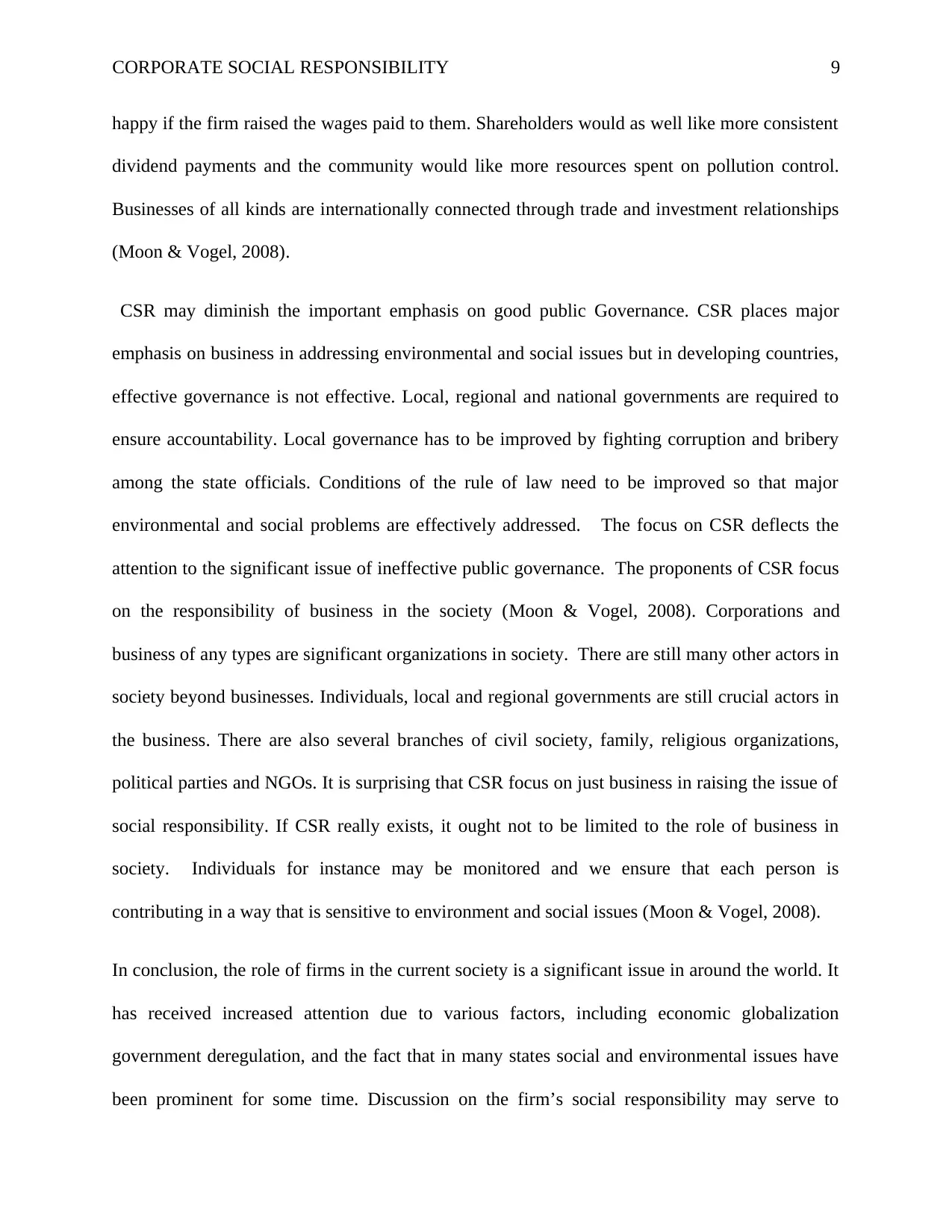
CORPORATE SOCIAL RESPONSIBILITY 9
happy if the firm raised the wages paid to them. Shareholders would as well like more consistent
dividend payments and the community would like more resources spent on pollution control.
Businesses of all kinds are internationally connected through trade and investment relationships
(Moon & Vogel, 2008).
CSR may diminish the important emphasis on good public Governance. CSR places major
emphasis on business in addressing environmental and social issues but in developing countries,
effective governance is not effective. Local, regional and national governments are required to
ensure accountability. Local governance has to be improved by fighting corruption and bribery
among the state officials. Conditions of the rule of law need to be improved so that major
environmental and social problems are effectively addressed. The focus on CSR deflects the
attention to the significant issue of ineffective public governance. The proponents of CSR focus
on the responsibility of business in the society (Moon & Vogel, 2008). Corporations and
business of any types are significant organizations in society. There are still many other actors in
society beyond businesses. Individuals, local and regional governments are still crucial actors in
the business. There are also several branches of civil society, family, religious organizations,
political parties and NGOs. It is surprising that CSR focus on just business in raising the issue of
social responsibility. If CSR really exists, it ought not to be limited to the role of business in
society. Individuals for instance may be monitored and we ensure that each person is
contributing in a way that is sensitive to environment and social issues (Moon & Vogel, 2008).
In conclusion, the role of firms in the current society is a significant issue in around the world. It
has received increased attention due to various factors, including economic globalization
government deregulation, and the fact that in many states social and environmental issues have
been prominent for some time. Discussion on the firm’s social responsibility may serve to
happy if the firm raised the wages paid to them. Shareholders would as well like more consistent
dividend payments and the community would like more resources spent on pollution control.
Businesses of all kinds are internationally connected through trade and investment relationships
(Moon & Vogel, 2008).
CSR may diminish the important emphasis on good public Governance. CSR places major
emphasis on business in addressing environmental and social issues but in developing countries,
effective governance is not effective. Local, regional and national governments are required to
ensure accountability. Local governance has to be improved by fighting corruption and bribery
among the state officials. Conditions of the rule of law need to be improved so that major
environmental and social problems are effectively addressed. The focus on CSR deflects the
attention to the significant issue of ineffective public governance. The proponents of CSR focus
on the responsibility of business in the society (Moon & Vogel, 2008). Corporations and
business of any types are significant organizations in society. There are still many other actors in
society beyond businesses. Individuals, local and regional governments are still crucial actors in
the business. There are also several branches of civil society, family, religious organizations,
political parties and NGOs. It is surprising that CSR focus on just business in raising the issue of
social responsibility. If CSR really exists, it ought not to be limited to the role of business in
society. Individuals for instance may be monitored and we ensure that each person is
contributing in a way that is sensitive to environment and social issues (Moon & Vogel, 2008).
In conclusion, the role of firms in the current society is a significant issue in around the world. It
has received increased attention due to various factors, including economic globalization
government deregulation, and the fact that in many states social and environmental issues have
been prominent for some time. Discussion on the firm’s social responsibility may serve to
⊘ This is a preview!⊘
Do you want full access?
Subscribe today to unlock all pages.

Trusted by 1+ million students worldwide

CORPORATE SOCIAL RESPONSIBILITY 10
remind companies the importance of complying with legal and ethical standards. The concept of
CSR threatens to evolve in a radical manner that creates problems for the future. Businesses are
crucial players in the society as it sells products and services that are household and provide
employment opportunities to various people.
remind companies the importance of complying with legal and ethical standards. The concept of
CSR threatens to evolve in a radical manner that creates problems for the future. Businesses are
crucial players in the society as it sells products and services that are household and provide
employment opportunities to various people.
Paraphrase This Document
Need a fresh take? Get an instant paraphrase of this document with our AI Paraphraser
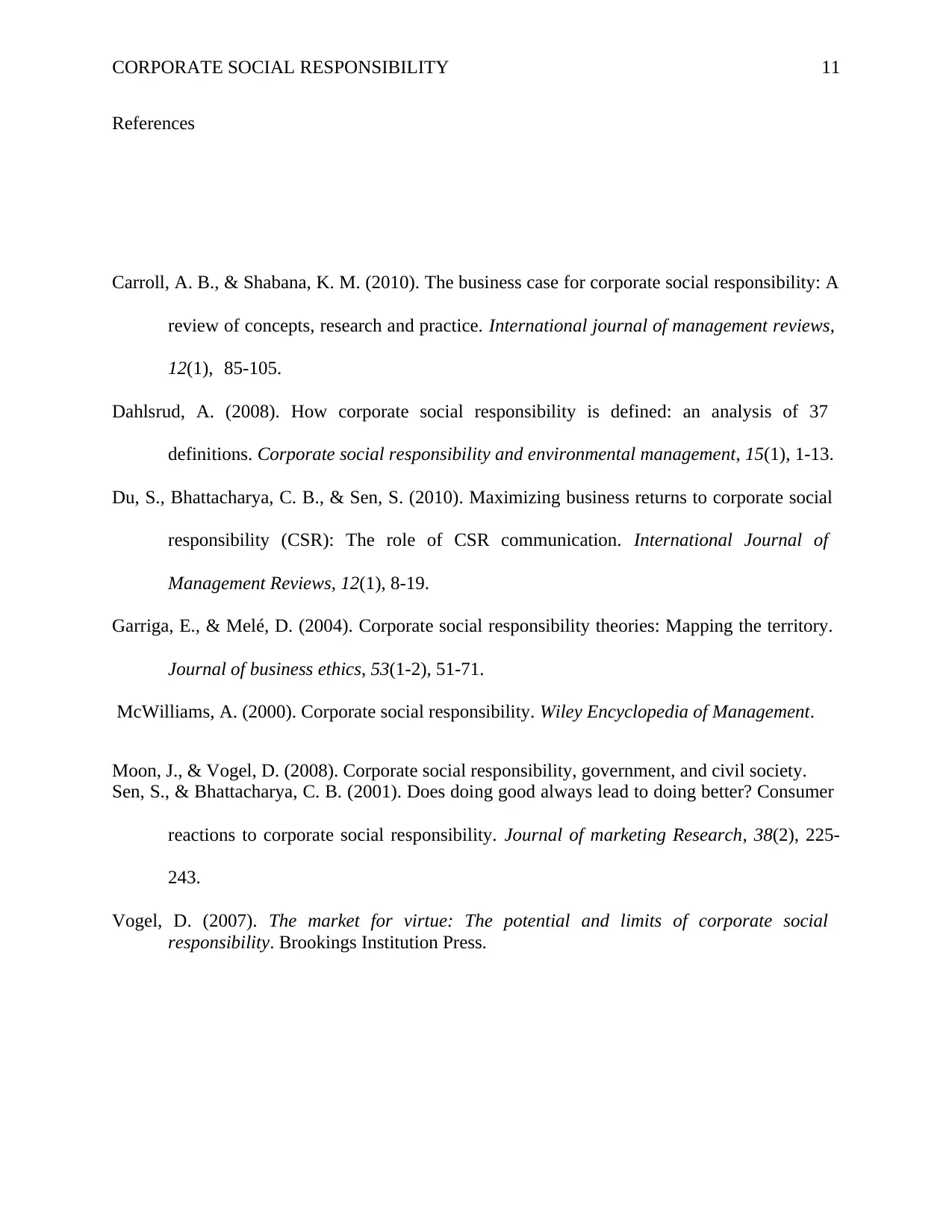
CORPORATE SOCIAL RESPONSIBILITY 11
References
Carroll, A. B., & Shabana, K. M. (2010). The business case for corporate social responsibility: A
review of concepts, research and practice. International journal of management reviews,
12(1), 85-105.
Dahlsrud, A. (2008). How corporate social responsibility is defined: an analysis of 37
definitions. Corporate social responsibility and environmental management, 15(1), 1-13.
Du, S., Bhattacharya, C. B., & Sen, S. (2010). Maximizing business returns to corporate social
responsibility (CSR): The role of CSR communication. International Journal of
Management Reviews, 12(1), 8-19.
Garriga, E., & Melé, D. (2004). Corporate social responsibility theories: Mapping the territory.
Journal of business ethics, 53(1-2), 51-71.
McWilliams, A. (2000). Corporate social responsibility. Wiley Encyclopedia of Management.
Moon, J., & Vogel, D. (2008). Corporate social responsibility, government, and civil society.
Sen, S., & Bhattacharya, C. B. (2001). Does doing good always lead to doing better? Consumer
reactions to corporate social responsibility. Journal of marketing Research, 38(2), 225-
243.
Vogel, D. (2007). The market for virtue: The potential and limits of corporate social
responsibility. Brookings Institution Press.
References
Carroll, A. B., & Shabana, K. M. (2010). The business case for corporate social responsibility: A
review of concepts, research and practice. International journal of management reviews,
12(1), 85-105.
Dahlsrud, A. (2008). How corporate social responsibility is defined: an analysis of 37
definitions. Corporate social responsibility and environmental management, 15(1), 1-13.
Du, S., Bhattacharya, C. B., & Sen, S. (2010). Maximizing business returns to corporate social
responsibility (CSR): The role of CSR communication. International Journal of
Management Reviews, 12(1), 8-19.
Garriga, E., & Melé, D. (2004). Corporate social responsibility theories: Mapping the territory.
Journal of business ethics, 53(1-2), 51-71.
McWilliams, A. (2000). Corporate social responsibility. Wiley Encyclopedia of Management.
Moon, J., & Vogel, D. (2008). Corporate social responsibility, government, and civil society.
Sen, S., & Bhattacharya, C. B. (2001). Does doing good always lead to doing better? Consumer
reactions to corporate social responsibility. Journal of marketing Research, 38(2), 225-
243.
Vogel, D. (2007). The market for virtue: The potential and limits of corporate social
responsibility. Brookings Institution Press.

CORPORATE SOCIAL RESPONSIBILITY 12
⊘ This is a preview!⊘
Do you want full access?
Subscribe today to unlock all pages.

Trusted by 1+ million students worldwide
1 out of 12
Related Documents
Your All-in-One AI-Powered Toolkit for Academic Success.
+13062052269
info@desklib.com
Available 24*7 on WhatsApp / Email
![[object Object]](/_next/static/media/star-bottom.7253800d.svg)
Unlock your academic potential
Copyright © 2020–2025 A2Z Services. All Rights Reserved. Developed and managed by ZUCOL.




